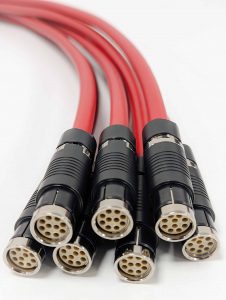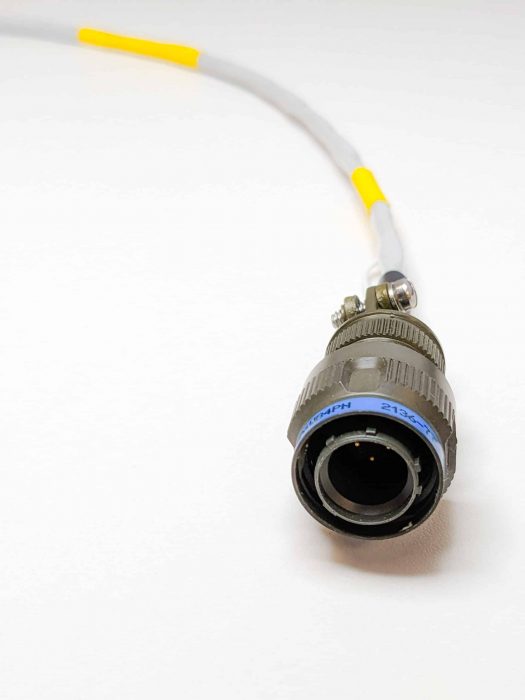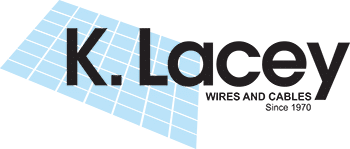- Home
- Market Sectors
- Sensor Cables
Sensor Cables

What is a Sensor Cable?
Sensor cable is designed to transmit signals from various types of sensors to control systems or monitoring equipment. These cables are often shielded to protect against electromagnetic interference and are used in applications where precise signal transmission is critical.
The Importance of Sensors in Modern Electronics
Sensors are capable of detecting a wide range of parameters including temperature, pressure, motion, and light, making them highly versatile tools.
The adoption of electronic sensors has transformed industries by enabling predictive maintenance, remote monitoring, and data driven decision making. In manufacturing, sensors are crucial for optimising production processes, ensuring product quality, and boosting overall operational efficiency.
Across various industries including healthcare, automotive, and aerospace, sensors enhance safety, reliability, and performance in critical systems, driving technological innovation and progress.
Types of Sensor Wire and Cable
Automation
In automation systems, sensor cables play a key role in linking sensors, actuators, and controllers. These wires ensure real time data transfer, enabling automated processes such as production line monitoring, robotic control, and industrial machinery operation.
Control Applications
Wires used in control applications are essential for transmitting control signals between components such as controllers, switches, and relays. These cables are designed to handle low voltage, high frequency signals while maintaining signal integrity to ensure smooth and precise control over industrial systems.
Pressure
Pressure sensor wires are used to connect pressure transducers or sensors that measure and transmit pressure data from machines or systems. These cables are typically designed for high durability, as pressure measurement applications can involve harsh environments with temperature fluctuations and vibration.
Proximity
Proximity sensor wires are employed to connect proximity sensors that detect the presence of objects without physical contact. These cables are often used in manufacturing, robotics, and security systems, providing reliable signal transmission to detect motion, position, or distance in automated processes.
Sensor Cable Standards
All of our sensor cables are manufactured to meet international quality standards, including IEC, UL, and RoHS compliance. We ensure that each product adheres to the relevant safety and environmental standards required for your industry.
K Lacey Sensor Wire and Cable
We offer a huge range of sensor cables that are suitable for a variety of applications. Contact us today to find the perfect solution for your specific needs.
The Benefits of K Lacey Sensor Cables
Sensor cables ensure accurate and uninterrupted signal transmission from sensors to control systems or monitoring equipment. Their high quality construction, often featuring shielding and insulation, minimises the risk of interference and data loss, ensuring reliable performance in demanding environments.
Designed to withstand harsh conditions, sensor cables are built to endure temperature extremes, moisture, vibration, and mechanical stress. This makes them ideal for use in industries such as manufacturing, automation, and aerospace, where long term reliability and flexibility are essential.
Sensor cables also enable real time data collection and communication, facilitating automation, predictive maintenance, and process optimisation. By providing continuous feedback from sensors to control systems, they help improve operational efficiency, reduce downtime, and ensure optimal performance across various applications.

Why Choose K Lacey for Your Industrial Cabling?
Boasting over 50 years of experience, K Lacey is the ultimate, go-to cables and wires provider across the UK and internationally. We offer a large stockholding of popular and diverse cables and wires, primarily sourced from leading UK manufacturers. This extensive range is generally available for immediate delivery.
Renowned for our outstanding customer service, unfaltering attention to detail, and unrivalled expert knowledge, we are here to answer any questions or queries you may have relating to your specific cable and wire needs. Contact us today to discuss your cabling and wiring requirements with our dedicated team of experts.
We also offer a range of other wiring and cables designed for the military, industrial environments and electronics.
Frequently Asked Questions (FAQs)
Yes, K Lacey Cables offers sensor cables designed for use in harsh environments. Our cables are made with durable materials that are resistant to UV, chemicals, extreme temperatures, and mechanical stress, making them ideal for outdoor, industrial, and extreme environment applications.
Yes, we offer customisation options for our sensor cables. Whether you need specific lengths, connector types, shielding, or special insulation materials, we can tailor cables to meet your exact specifications.
Our sensor cables are made from high quality materials including copper for conductivity, PVC or polyurethane for insulation, and specialised shielding such as braided copper or aluminium to protect against electromagnetic interference and noise interference.
Our sensor cables are available in a variety of temperature ranges depending on the material and design. Some cables can withstand temperatures from -40°C to 200°C, while others are optimised for even higher or lower extremes. Please contact us for details on specific cable types.
The right sensor cable depends on factors such as the type of sensor, operating environment, temperature range, required signal integrity, and mechanical stress. Our team can assist you in selecting the best cable based on your specific needs, ensuring optimal performance.
Yes, all of our sensor cables are manufactured to meet international quality standards, including IEC, UL, and RoHS compliance. We ensure that each product adheres to the relevant safety and environmental standards required for your industry.
Yes, we offer sensor cables that are suitable for medical applications, including patient monitoring systems and diagnostic equipment. These cables are designed to meet strict hygiene, safety, and signal integrity standards for medical use.
The lifespan of a sensor cable will depend on factors such as usage conditions, environmental exposure, and mechanical wear. In general, our sensor cables are built for long lasting performance and, with proper care, can provide reliable service for many years in demanding environments.
